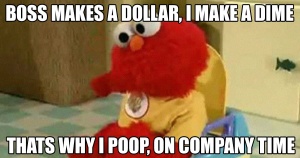Online Liability
Contents
Intro
The idea that we are responsible for our actions is something that we must learn before becoming an adult. Some of us learn early, by being disciplined by parents at a young age. Some learn a bit later, like when you find out you can’t go to a good college because you didn’t try in high school. My point is, most adults know that we are responsible for the actions we choose to take in the real world; the digital world, on the other hand, is a grey area in which many people are not completely sure to what extent they are liable for their actions. Ultimately, this comes down to privacy and people not completely understanding what they post on the internet can be seen or traced back to them and what information is private or anonymous.
What is Online Liability?
Liability is the notion that we have responsibility for something or someone [1]. Typically, this is legal term but can be used to encompass anything which is our own responsibility. Online liability is simply the notion that we are responsible for our actions online (or even someone else’s actions online). Today, the things we post online can affect our personal relationships, employment opportunities, and even have legal consequences.
Implications of Online Activity
On Employment
Cody Hidalgo, a resident of New Boston, Michigan, was fired from his job for a Facebook post that he shared [2]. On October 20th, he shared a meme of Elmo that reads “Boss makes a dollar, I make a dime. That’s why I poop on company time” [3]. Cody’s boss responded by texting him “We don’t make a dollar when you’re shitting all of the time. Why don’t you stay home and do your shitting. I don’t want to play your bullshit games. Maybe there’s a company out there that will put up with your games because I won’t. Good luck!” Apparently, Cody had no clue what his boss was talking about – he probably didn’t think twice about sharing the meme he found funny on Facebook. After doing a bit of snooping on his profile, I found out that he has since removed the Elmo post but posts from around the time of October 2017 were of a similar theme – stupid yet funny memes found on the internet. Cody had no clue that this post would affect his employment; if he did, I could not imagine him thinking that it would be worth it to post.On Reputation
Cody was not the only one affected by his online liability. The business that fired him received a backlash after he posted the text messages that his boss sent him online and they went viral. Although the business has changed its google listing so the myriad of bad reviews are no longer available, its Facebook and Birdeye profile have hundreds of 1 star reviews relating to this specific incident [4][5]. This shows how we are not only liable to the posts we make, but also the posts that others make involving us.In Court
People can also be held legally liable for online activity that isn’t even theirs. In Espinoza v. County of Orange, an employee successfully sued his employer after co-workers bullied him online relating to his disabilities and managerial capabilities [6]. The employer claimed that this was not work related since it took place outside of office hours, but the court ruled that the employers were responsible for addressing this issue and trying harder to settle it. Although the employees were not liable since the posts did not constitute harassment, the employer was sued over $800,000.
We are not only liable for what we post publicly, but also for our online trail that we create through things such as google searches. Although the FBI does not have the resources to monitor everything that everyone searches, they can use your google search history in court and monitor high risk people. In fact, it is common for courts to refer to this online trail in most serious court cases [7].
Conclusion
With all this data that can be traced back to us online, we must be extremely careful what we do and what we put out into the info sphere. Some people feel as if they are behind a veil when interacting with the online world and will not have to answer for what they do on the online platforms they use. What we put online affects us and others around us so we must take responsibility because we are liable for our digital footprint. Additionally, it is up to us and online platforms to educate users on what is public, what is private, and if the platform could potentially be hacked.
References
- ↑ “LIABLE: Definition in the Cambridge English Dictionary.” LIABLE | Definition in the Cambridge English Dictionary, dictionary.cambridge.org/us/dictionary/english/liable.
- ↑ "Cody's Facebook Page https://www.facebook.com/cody.hidalgo.
- ↑ "Guy Got Fired for Posting a Meme About Pooping at Work" Robin Zlotnick, 2019.
- ↑ “Roman Stone Works.” Facebook, 2020, www.facebook.com/Roman-Stone-Works-147540485290249.
- ↑ “Roman Stone Works Reviews, Ratings: Consumer Services near 13000 Lyndon St , Detroit MI.” BirdEye, 2020, reviews.birdeye.com/roman-stone-works-149222628834825.
- ↑ Court of Appeals of California. “ESPINOZA v. COUNTY OF ORA: No. G043067, Consol...: 20120209057.” Leagle, Court of Appeals of California, Fourth District, Division Three.Leagle.com/Images/Logo.png, www.leagle.com/decision/incaco20120209057.
- ↑ Tait, Amelia. “How Your Google Searches Can Be Used against You in Court.” How Your Google Searches Can Be Used against You in Court, 11 Aug. 2016, www.newstatesman.com/science-tech/internet/2016/08/how-your-google-searches-can-be-used-against-you-court.

